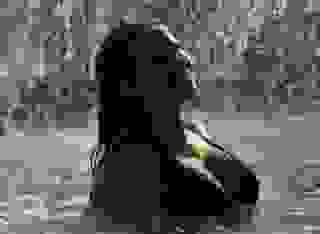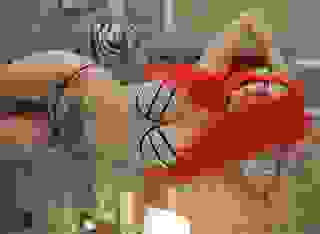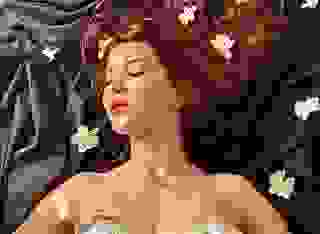Note: You can change font size, font face, and turn on dark mode by clicking the "A" icon tab in the Story Info Box.
You can temporarily switch back to a Classic Literotica® experience during our ongoing public Beta testing. Please consider leaving feedback on issues you experience or suggest improvements.
Click here"A hospital and a doctor. They can monitor reactions to drugs and perform a Caesarean if needed."
"And if not?"
"Those are the options."
We'd already run out of other choices. We were in marginal cell-tower range at best of times, and with this much coming down, we couldn't even get a bar of service. We did get through to one of our neighbours, the Tremblays, on the CB, but they were on the same side of the river as we were and said they had no better luck with phones than we did. Calling for an ambulance was out.
Even if we could make a call, they told us that trees were coming down all over from the weight of snow and ice, and one was blocking the bridge where the road crossed the river. "You'll have to divert up through Saint-Denis and cross there," Mr. Tremblay said.
"That'll add a couple of hours."
"In this weather, at least that," he responded. "Good luck."
Dad and I started up the truck. Fortunately, we decided to do a test run down the road before we dragged Nadie out. Fortunately, because we couldn't get far. It needed something like a municipal truck with a big blade on the front, not a quarter-ton pickup with a driveway plow and cinder blocks in the back for traction.
Thoughts about centuries of women dying in childbirth started running through my mind. I lived in the twenty-first century, but I might as well have been in the seventeenth for all the good that did me right now, stuck in the middle of the biggest fucking snow-and-ice storm for a decade.
It was time to take the initiative away from that son-of-a-bitch storm.
"Dad, pull the CB from the truck. I'm going to get one of the snowmobiles running. Hopefully, I can get around that tree that's blocking the bridge. I'll go until I can raise someone on the CB or until I find someone with a working phone. I'll get an ambulance to start toward the bridge. Once I've got them started, I'll come back, and we'll get Nadie across even if I have to carry her."
He nodded. "Good idea. Just one change. I'm going on the snowmobile. You're staying with your wife." The tone wasn't brooking argument, and there wasn't time anyway. I nodded and headed to pull the CB.
The wait was excruciating. It wasn't helped by the whispered conversation between Mom and Mrs. Curry.
"What?" I demanded.
"Her blood pressure is climbing. There are signs of foetal distress."
That set my blood pressure climbing too, but I didn't say anything. We went back to waiting.
The base unit for the CB squawked. Mom went to answer.
"Oh my God!" I heard Mom wail. "Is he all right?"
"What?" I yelled.
She ignored me and hunched over the headphones the way people do when they're trying to hear better. I continued to demand to know. Finally, she said, "Wait one," into the headset's microphone and turned to me. "Jed! Shut the hell up. I'm trying to find out what's happened to your father."
The shock of hearing that from my mother, who never talked that way, did its job and I shut up. I waited until she signed off.
"The bridge is completely blocked. Your father couldn't get across it. He tried to go down and cross the ice." I could feel the sudden grip on my heart. "The ice didn't hold. He got to shore and managed to get to the Tremblays on foot. He was soaked and hypothermic, but they think he got to them in time before frostbite set in." She collapsed onto a kitchen chair and started crying.
I turned to Mrs. Curry. "It's not going to get better on its own? With Nadie, I mean. Right?"
She shook her head. "Probably not."
"Right. Put her in her warmest clothes. Then get the sleeping bag in my closet and grab some comforters. Mom, get a big plastic sheet from the basement to keep snow from soaking in. I'm taking the other snowmobile with the pulk behind it."
My mother started to protest. "The bridge is—"
"I'll cross at the footbridge up by Miller's Creek. I think it's wide enough for a snowmobile. If not, I'll cross up at Saint-Denis. Nadie is going to the hospital." Without waiting for answers, I went for my coverall and snow boots.
The universe wasn't done. I pressed the starter button. Not even a click. I checked the kill switch. I checked that the key turned fully. I tried again. Not even a click. I looked at the combination charging station and block heater. The little green light was out. We'd been without hydro for almost twenty-four hours, and the generator only ran the house. The cold was brutal. This was the older machine, the one with the older battery.
Then I lost it.
"YOU MOTHERFUCKING, SHIT-EATING, DICK-FACED FUCK-STAIN," I screamed up at the storm. "YOU ASS-LICKING, MOTHERFUCKING—" I broke off at the shocked expression on the faces of two of the women, the ones supporting the third who was looking at me with an expression that was three-quarters gone.
And one-quarter saying, "I believe in you."
From that look, a sudden calm took hold of me. I looked at the motherfucking—my mind now said that in lowercase—machine that wouldn't start. Words from years ago replayed:
"But when it's thirty or more below and it won't start because you forgot to set the choke before stopping the last time, or forgot to plug in the block heater, well ..."
I looked at the two older women. "Put her in the sleeping bag and then in the pulk. As far to the front as you can. Pack the comforters around her. Put the plastic over it. Let's go. Now!"
I grabbed what I needed and stepped outside. I gave a particular two-tone whistle. As if he had been waiting all this time for me to get around to noticing him, Pie Thief stepped out of the dark. Years of practice made my hands swift.
As Mom and Mrs. Curry watched silently, I slid in so that Nadie was between my legs and snapped the reins.
Two years of trying and refining and rebuilding had worked. The keel and strakes made the pulk run true. We went.
At the turn-off for Miller's Creek, I leaned, and the edge carved a long turn in the snow like a kayak. I could have enjoyed this first real test if it weren't for why I had to do it. I talked to her, telling her I loved her.
"I love you too," she said.
I told her we'd make it.
"I know," she said.
I told her of passing landmarks.
"It's hard for me to talk, Jed. I'll just listen," she said.
That scared me. "Nadie."
No answer.
"Faster," I urged and gave the reins a snap. Pie Thief broke into a trot.
We could hear the soft cracking of branches giving up the fight against the weight of ice and snow; sometimes the longer, dragged-out cry of a tree doing the same. Those sounds and the howl of the wind, the muffled pocks of Pie Thief's hooves punching through the snow and the ssshhh of the hull were the only noises in the blanket of stillness.
We started down the long hill toward the footbridge. My eye judged what it could see in the darkness. Pie Thief would fit. I was pretty sure the pulk would also.
Then the ice took down another tree to our left. With a loud bang of suddenly released tension and a rending screech, it toppled our way. It wouldn't have hit us, but it was too late: Pie Thief jerked and bolted to the right. Not a hard turn toward the high banks of snow but down toward the river.
For three long seconds, I thought it might work. In the moonlight, the ice looked unbroken.
At the last second, I saw it: the dark line of blackness running jaggedly down the centre. Highlights glinted on it in the bright moonlight, poisonous green and blood red. I tried to draw back on the reins, but I'd looped them and Pie Thief was in panic mode.
If time had slowed as everyone claims it does in car crashes, maybe I could have done something ... unwrapped the reins, pulled Pie Thief to the side. But it didn't. It accelerated into a blur of impressions. I caught a glimpse of the drifts along the bank edge as they rushed toward us and could only hope the wildly-slewing pulk would capsize on one of them, that I could somehow cushion Nadie against the impact.
I crouched over her, even in desperation making sure not to press on her belly, and wrapped my arms tightly about her. I cradled her head into the hollow of my neck and shoulder, and whispered, "I love you," so that it would be the last thing she heard.
The pop of a root passing under us, the soft thud of bouncing off a snow-cushioned rock. Then quiet. And then a BANG! like the universe was ending and my head slammed into the side of the pulk. It rolled and threatened to dump us, and I suddenly wanted to vomit. Through the disorientation and the pain, I waited for the dark, cold water to fill and take us under. And then I did vomit.
I half-woke to various voices—"... blood ... one fifty over ninety ... page Doctor ... saline IV ..." then I faded out again. I'm not sure how long it was before the world came back a second time. It took a few seconds for things to make sense.
"Back with us, Mr. Webbe?" a cheerful voice asked.
I looked over to see a nurse. "Where's Nadie? I need to see—"
"She's fine. But I'm afraid you can't see her right now." She put up a calming hand as she saw my upset skyrocket. "She's fine. But she's in surgery right now. They needed to do a C-section. And you need to lie back. You're under concussion protocol." She pressed back on my shoulder as I tried to sit up. Like nurses the world over, she was stronger than she looked, and back I went, regretting the sudden move as my head pounded.
"She's fine," she repeated.
I lay back and counted ceiling tiles ... and fretted. And fretted some more.
"Congratulations, Mr. Webbe." It was a different nurse. "You're the father of a beautiful little girl. Mother and daughter are doing well, and as soon as everyone's cleaned up, we'll take you to see them. Your wife's in recovery and will be kind of groggy, but she's perfectly fine."
I sat in the recovery room for an hour, a tiny miracle bundled into the curve of my left arm, my right hand clutching my other miracle.
"Thank you for getting me here," she murmured weakly before drifting off again. Finally, they moved us to a maternity room where we had a visitor.
"I came because I thought you might need some help," Kerstman said.
I nodded, still reeling from adrenaline-fueled shock after adrenaline-fueled shock, not even questioning how he heard or how he'd gotten here.
"I'll get Pie Thief home for you." He smiled. "The front desk says they'll validate his parking."
I laughed and then regretted when my head complained. I knew Nadie and I were the talk of the hospital, if not the town, having arrived semi-conscious in a caribou-drawn sled. A security guard told me they'd tied his reins to the fence where he could reach some grass, but they had no idea what else to do.
"Thanks."
I spent the night uncomfortably on the bedside chair that pushed back into a recliner but unwilling to have it any other way. They discharged me in the morning but were keeping Nadie for a few days. I didn't want to leave but, "Go," she said. "Bring Mom back and my blue nightgown—she'll know which one—and a brush and ..." The storm had finally broken, and the downtown streets were being cleared.
I stayed at Nadie's house with her mom. My parents grumbled that all they got those first two days were a bunch of cellphone pics, but it was good-natured. It took another full day for the roads to be plowed out to our house. Then they brought my truck over so I had some way to get home, and they spent a joyous day with their first granddaughter.
Kerstman returned, finding me outside grabbing a breath of fresh air while Nadie napped with Ann. The grandparents had all left a bit ago. He grinned. "Born on 21 December, the feast day of Peter Canisius. He was a leading voice for tolerance and a great scholar. Maybe she'll be a professor."
"Or maybe a musician since it was 2112 and seeing as how we live in Ontario." I was pretty sure he wouldn't get it—he seemed more the Whitney Houston type—but he grinned.
"Let me guess. You were about fourteen when you discovered Rush?"
I thought back. "Yeah, fourteen. I got Moving Pictures that Christmas."
He rootled around with his pipe as we enjoyed the last light of the day. "Quite a ride you had."
"I don't know how—" I tried again. "I have no idea how we got here. It's a blur. The river ..."
"You jumped it."
"No," I scoffed. "Somehow we got lucky and found a finger of ice."
"There are no fingers of ice there, Jed. You jumped it."
"That's impossible."
"Yes. But not that ride. Pie Thief took you over."
"No."
"Yes. Occasionally, when the time is right, someone like him comes around."
"What? What does that mean? No. It's impossible."
"It is?"
He let it lie. I marvelled at how peaceful it seemed after the chaos of getting to this point. I could hear the wind and the creak of ice, but no cars were driving by, no people other than us, and the distant road noise was silenced by the blanket of snow. Even the sounds from the hospital were taken away by the wind. There was no man-made noise except our breathing.
"Let's go see for ourselves, shall we?" he asked. "Nadie will be asleep for a bit. Take your truck. I came by sled, so I'll meet you there."
I did. I got there first ... or I thought I did until I saw the faint gleam of an ember-lit face a way off, sitting on a fallen tree trunk. He smoked and let me be. I turned back to the sight in front of me and ... just ... let it soak in.
The snow leading down, hoofprints brushed almost out of existence by the hull of the pulk sweeping over them. Then the gleaming blanket of untouched white. The dark rush of water, lace-edged with knives, singing of cold and destruction. Another pristine expanse. Finally, the explosion of snow, cast out in waves from impact, skewing first right then left then right again before straightening to track true.
The utter impossibility. I had to turn my head to take it all in. Far longer than I could even conceive of sending a rugby ball.
I trudged through the drifts to his side. He stood, rapped the pipe against his bootheel, and stowed it away. He looked different in the fading twilight than he had just a half an hour before. Shaggier.
"You going back to stay with Nadie?"
I nodded.
"I have to get going now. You're okay to drive?"
I nodded again. I heard a noise in the shadows, a familiar grunt. I peered off to my right, looking for the sledge that had brought Kerstman here, wondering why he had Pie Thief with him.
Despite the trees and the fast-disappearing light, it was bright enough that I could see. Pie Thief was using his sharp winter hooves to dig up a morsel from under the snow. Behind him: the high-curling metal runners instead of the flat skis; the cheerful red paintwork with its gold trim that twinkled the light back to me instead of the beaten, black, utilitarian finish. The mounded tarp in the back and the eight-in-hand drawing the sleigh, all standing quietly.
I suddenly understood. Funny; the only surprise was how little surprised I was. Was it something about this quiet time ... this moment where we seemed to stop in the gap between seconds? Somehow, magic could happen in those not-moments; I could feel it.
I glanced at the figure next to me—Kerstman but not the Kerstman of the bicycle bell and Canadian Tire toque—watching me with a quiet smile. I looked back at the eight. I named them.
"No," he said, as I got to the second.
I looked at him in surprise.
"Dancer last came out with us in 1939. She'd been at it a long time." He smiled at some fond memory. "A long, long time, and there was someone ready to take her place the next year. She's home in the warmth." He looked at me. "If you ever meet her, we call her Tanssija. It was the name given to her ages ago by the woman who cares for her. Dancer is the English version."
He walked down the side of the eight, his gloved hand stroking necks in affection. When he got to the pair attached to the pole, the ones who would brake and turn, not merely draw, he turned to me with a twinkle. "The wheeler pair. You've met Thunder and Lightning."
"Donner and Blitzen," I said.
"Yes. The author thought their real names sounded less bombastic than the English versions when he wrote the poem."
Thunder's— I mentally adjusted. Donner's signature blast cut through the quiet, causing us both to laugh.
"And Kerstman?" I asked.
He shrugged. "Lots of names out there. Like caribou: exact same animal as the reindeer; it just matters which side of the world you're on as to what you call it. There are a lot of folks of Dutch descent in these parts, and Kerstman doesn't sound so strange."
We stood and stared into the dark. I didn't know what he was thinking. Perhaps he was remembering years and decades and centuries of nights like this. I was thinking that it was only the twenty-fourth, but I had received my presents early. Two of them: wife and daughter, forever precious and loved.
Kerstman broke it first. "Well, I have to go. Now that he's started, I'll take him with me to get used to it. He can run alongside." I knew he didn't really mean run.
Nadie looked quietly at the tracks in the snow: the ones leading down; the others across the dark water and up the other bank. They were somewhat obscured by a week's light flakes, but you could still see them on the crisp January day.
We had looked at my ordnance map. The blue line for water was 2 millimetres and a hair wide on the piece of paper: over 50 metres, that represented. Plus the embankments on either side. Staring at it in real life was so much more ... intimidating. She took it more easily than I had. She stared long and hard at the dark water and then turned to me.
"You must have been petrified."
She looked beautiful there in the brilliant sunlight. We'd gotten off the pulk for the last little bit, obeying doctor's orders for some gentle walking each day. The exertion had put a gleam of sweat on her forehead and she'd unzipped her parka, but she insisted she was fine and thrilled to move after days in a hospital bed.
I shook my head. "Only of losing you. It's why I didn't see what happened. I was wrapped around you, hoping we'd dump on a snowdrift or something before the water, and I could cushion you."
Her expression melted into something warmer. Much warmer. She leaned up and kissed me. "Thank you. I believed in you."
Then she leaned into Pie Thief, who had ambled along behind, and wrapped one mittened hand up over his withers.
"Pimisaywinenen," she murmured toward a large ear that twitched in her direction.
I raised an eyebrow in question.
"Flying man." She ruffled his fur, leaned in to kiss the furry check. "My big flying man." Then she burst into laughter as Pie Thief's snuffling for possible treats popped open the top two buttons of her shirt. "You taught him to do that."
"No." I laughed with her. "That's all him. But it makes him a great wingman."
"Well, he needs to unlearn it because you're not allowed a wingman." Her voice was stern, but I could see the dark eyes dancing. She grinned at where I was looking. "Just your luck. I finally get some curves and our daughter has them reserved."
"Ann and I could share."
"Eww! That is not sexy, mister. That's baby milk." She relented at my expression. "I can't right now, Jed. I have to heal; six weeks more the doctor said. But when I have, I'll be asking." She reached up and pulled my head down for a kiss, full of tongue and promise.
"And if someone were to be really, really good about middle-of-the-night wakeups and diapers, maybe I could be really, really good about something else." Her tongue traced a slow arc across her lower lip then, with a wink and a chuckle at my involuntary catch of breath, she pulled back and refastened the flannel.








